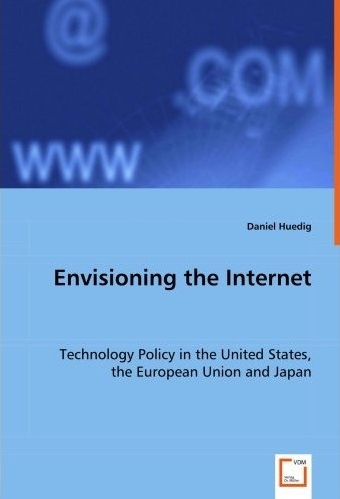 The vision of a
future information and communication society has prompted leading politicians
in the United States, the European Union and Japan to influence or even
lead the economic and social transition in the context of an active technology
policy. The technological development of society, however, is a product
of a complex interplay of technological, economic and socio-political constraints.
These constraints limit the political decision-making and implementation
abilities. Moreover, facts and information are continuously changing
during a paradigmatic technological, economic and social shift, which limits
political decision-making abilities.
This study compares
political decision-making to promote computer-mediated communications in
the Triad since the beginning of the 1980s, on four levels: the development
of a political vision, the long-term aims and strategies, technology policy
(e.g. the promotion of technological development and competition policy)
and regulatory policy (e.g. universal access, protection of privacy and
intellectual property). While technology policy tends to be uncontroversial,
during a paradigmatic shift regulatory policy is difficult and lengthy.
Nevertheless, the inclusion of interest groups, which rise during this
paradigmatic shift and which are close to the technologies and their societal
consequences, help to aid decision-making processes. In this context,
politics in the United States has been more successful that in the European
Union and especially Japan.
Although this study
predates the rise of eCommerce over the Internet, it addresses many of
the themes underlying it. Of these themes, many remain politically
unsettled, both on national, supranational and especially international
levels. For example, for encryption and secure payments, which are
necessary for eCommerce, no international standards do yet exist.
The issue of taxation has hardly been opened for discussions. In
sum, this study does not only offer a historical overview of the development
of the Internet, but it also discusses issues of continuing present concern.
|
|
 Die Vision einer zukünftigen Informations-
und Kommunikationsgesellschaft hat führende Politiker in den USA, der
Europäischen Union und Japan bewegt, den Wandel im Rahmen einer aktiven
Technologiepolitik zu beeinflussen oder sogar zu lenken. Die technologische
Entwicklung der Gesellschaft ist aber ein Produkt eines komplexen Zusammenspiels
zwischen technologischen, ökonomischen und sozio-politischen Sachzwängen, welche
die Entscheidungs- und Handlungsfreiheit der Politik einschränken. Darüber
hinaus verändert sich ständig die Informationsgrundlage während eines
paradigmatischen Wandels, welches die Entscheidungsfähigkeit von
Entscheidungsträgern begrenzt.
Diese Studie vergleicht die
Politik betreffend computer-gestützter Kommunikation in der Triade seit Beginn
der achtziger Jahre in vier Stufen: die Entwicklung einer politischen Vision,
die langfristigen Ziele und Strategien, Technologiepolitik (u. a.
technologiefördernde Maßnahmen und Wettbewerbspolitik) und flankierende
Regulierungspolitik (u. a. universeller Zugang und Schutz der Privatsphäre und
des geistigen Eigentums). Während technologiepolitische Aspekte relativ
unkontrovers sind, sind regulierungspolitische Prozesse schwierig und
langwierig. Feststellen lässt sich eine Erleichterung der Beschlussfähigkeit
durch die Einbeziehung neuer Interessengruppen, welche dem entstehenden
Paradigma und dessen Technologien nahe stehen. In diesem Aspekt waren die USA
erfolgreicher als die Europäische Union und besonders Japan.
Obwohl diese Studie vor dem
Aufstieg des eCommerce im Internet geschrieben wurde, verbleiben viele der
Themen auf der momentanen politischen Agenda, auf den nationalen,
supranationalen und internationalen Ebenen. Z. B., für Verschlüsselung und
sichere Bezahlsysteme, welche unvermeidlich für eCommerce sind, existieren keine
internationalen Standards. Besteuerung im Internet ist ein Thema, welches erst
seit kurzem auf der politischen Agenda steht. Zusammenfassend, diese Studie
bietet nicht nur eine historische Aufarbeitung der Entwicklung des Internets,
aber sie befasst sich auch mit Themen, welche im Sommer 2000 immer noch hoch
aktuell sind. |


